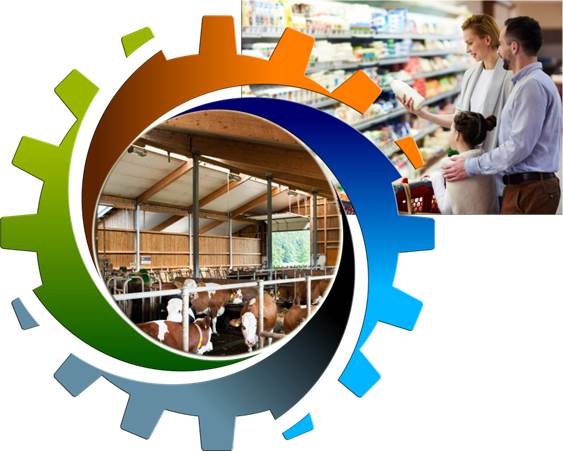Der erste Pfad führt in die interne Optimierung der Produktionsmethoden und wirtschaftlichen Entscheidungen. Der zweite Pfad zeigt die marktwirtschaftlichen Möglichkeiten, die sich aus der wissensbasierten Bewertung ganzer Produktionsnetzwerke ergeben. Ökoeffiziente Milchwirtschaft generiert ihre Chancen aus der Weiterentwicklung von Partnerschaften zwischen Anbietern und Molkerei. Auf diese Art entwickelt sich die Milchwirtschaft über die Quantitäts- und Preisfrage hinaus.
Im gesamtheitlichen Ansatz der Ökoeffizienz nimmt die Molkerei als Verfahrens- und Marketingexperte eine anteilige Rolle im Produktdesign ein und kann daher bessere Marktchancen, speziell für die konventionelle Milchproduktion, in Gang setzen. Im vorliegenden Projekt wird FarmLife mit allen Teilbereichen (Resourcen, Nährstoff- und Schadstoffmanagement, Wirtschaftlichkeit, Tierwohl und Biodiversität) in die zwei unabhängigen bäuerlichen Netzwerke der Obersteirischen Molkerei und der Gmundner Milch eingeführt.
Aus den Ergebnissen wird eine nachhaltige Beschreibung aller Umweltwirkungen und Produktionsaspekte abgeleitet, die die Basis für die Erstellung von Langzeitproduktionen und Marktkonzepten der Molkerei bietet. Diese partizipative Abwicklung wird durch externe Kompetenzen ermöglicht. Alle Teilziele werden an der Optimierung der Betriebe hinsichtlich der ökoeffizienten Landwirtschaft und an einer regelbasierten Vermarktung der Produkte durch die Molkerei ausgerichtet.
The concept of eco-efficiency will support a location-adapted and performance-oriented dairy farming able to minimize its environmental effects.
This approach with the farm-management tool FarmLife was tested in a regional group in the project DAFNE 101152 for the first time.
The results clearly show two paths of acting in order to support dairy farming. The first path leads into the internal optimisation of production methods and economic decisions. The second path shows the marketing opportunities that arise of a knowledge-based evaluation of whole production networks. Eco-efficient dairy farming generates its chances from the further development of the partnership between suppliers and dairy. In doing so it widely surpasses the questions of quantity and price.
In the overall approach of eco-efficiency, the dairy as processing and marketing expert adopts a partial role in the product design and thus lances better market chances especially for the conventional dairy production.
Within this project, FarmLife is introduced with all sub-sections (resource, nutrient and pollutant management, economy, animal welfare, and biodiversity) in two independent networks on farm level of the Upper-Styrian dairy and Gmundner Milch.
From the results a sustainable description of all environmental effects and aspects of production is derived. This description forms the basis for the drawing up of long-term production and marketing conceptions by the dairy. This participatory processing is facilitated by external competences.
All partial objectives are aligned to the optimization of farms in terms of eco-efficient agriculture and the rule-based marketing of the results by the dairy.







